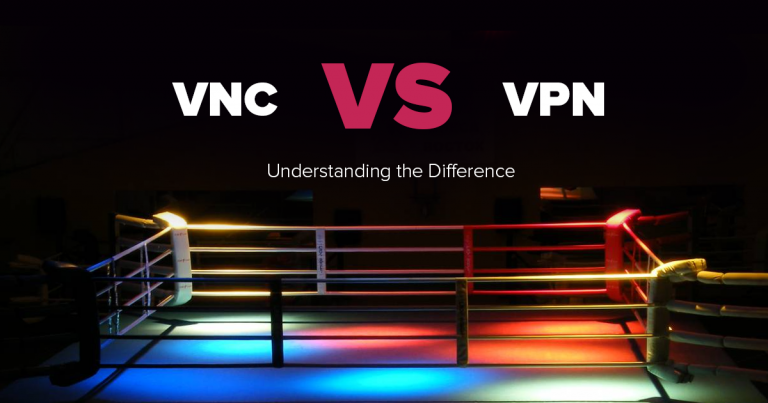VPN vs. VNC - Which is Safer? Which is Faster?
VNC (Virtual Network Computing) and VPN (Virtual Private Network) may sound similar, but they are in fact quite different.
Virtual Network Computing is used on computers to view and control other machines remotely over a network connection. It is extremely useful for using a desktop on the road or from another part of the house. It is also a good tool for administrators to remotely troubleshoot networked computers.
VPNs, on the other hand, connect computers to a secure network using a specific server. Any data sent between these computers are encrypted, making it an ideal solution for businesses and those who want to protect their information.
How do VNCs work?
VNC’s code is open source under the GNU General Public License and was developed at AT&T Laboratories.
VNC is built on a Remote Framebuffer or RFB. This robust protocol allows a server to update the framebuffer on remote computers. It is an independent platform, so it can be used on all operating systems and graphic interfaces.
VNC uses a client-server model where a viewer is installed on a local computer and connected to a remote one. It interprets user commands such as keystrokes or mouse clicks from the viewer and performs corresponding actions on the server.
All VNC machines must connect with TCP/IP and have ports open to allow traffic from IP addresses on the devices that need to connect
What are common uses of VNC?
- Remote Employees
Many businesses allow staff to use their computers remotely while they are away from the office. They can access their organization’s important documents from anywhere using a VNC connection. This also enhances security as data never has to leave the office. - Business Continuity Processes (BCP)
Sometimes a catastrophe can make physical access to the workplace difficult or impossible. Since many companies store data in the cloud, a VNC can be extremely useful here. In the event of disaster, you may not be able to access a server via normal means. Some providers will let you launch a temporary VNC to allow remote access to the console. - Remote Technical Support
VNC is one of the most popular choices for remote tech support. Technicians can operate your computer as if they were onsite and quickly fix problems without needing any prior knowledge of the person needing support. Many IT departments use VNCs to provide comprehensive technical support. It’s the perfect solution since the receiver can watch everything happen on the screen and step in whenever necessary. However, although VPN and VNC are among the most commonly used terms in the field of information technology, they mean quite different things.
What are VNC’s Disadvantages?
- They use excessive bandwidth
A VNC uses a lot of bandwidth. In order to combat this, it’s best to use low resolution, greyscale screens for quicker transfers. - They run slower
The most basic form of VNC code uses raw encoding. This is a very primitive and slow technique, and if the client and server computers do not share advanced encoding methods, the raw screen is sent from one to the other pixel-by-pixel from left to right. Usually, only the changed pixels are sent to limit the negative effects. This is fine for small movements like mouse cursor changes but will not work when the entire screen is changed. - Reduced application usability
VNC only allows you to use applications installed on the remote computer. If you want to use a local application remotely, you’ll need to install it on the remote machine first.
What are the differences between a VNC and a VPN?
Typically employed for remotely managing desktops via a network connection, a VNC enables the control of computers from another system.
A VPN is a very popular software implementation that also allows users to connect their computers to a network.
A VPN provides more advanced concepts, like tunneling protocols. It’s a way to build a private network over a larger public one like the Internet.
A VNC allows you to control a remote computer, generally over a VPN.
A VPN will let any application on your desktop access the Internet via a secure and encrypted connection. It will also hide your identity by changing the IP address giving you access to a plethora of restricted websites.
VNC versus VPN. Which is Better?
Even though VPNs are more complicated to set up than VNC connections, they allow you to use local applications on a remote network just like if you were at home or in your office.
VPNs enable VNC connections to desktops via remote networks and make sure that servers are not exposed to the public internet. This improves security greatly by using a VPN to connect to a remote network and using a local VNC client to access desktops.
VPNs allow you to transfer files from a remote folder to a local folder and print documents on a remote server to your local printer, whereas a VNC only allows you to access a primary remote computer.
Privacy is a primary concern these days, and a VPN is an excellent way to maintain privacy and anonymity. VPNs encrypt all traffic between your computer and the VPN entry point. They can also be very useful when evading online censorship or using an IP address that is not directly associated with you.
When it comes down to it, a VNC is great for businesses or individuals who want to access a remote computer, but a VPN is better for those who also want to encrypt their files and secure their data.




Please, comment on how to improve this article. Your feedback matters!